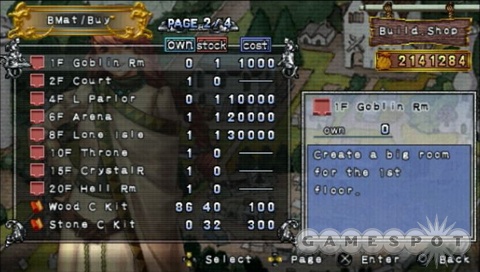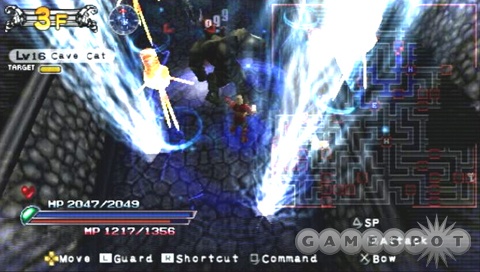There's nothing quite like Dungeon Maker: Hunting Grounds. Half action role-playing game and half dungeon-construction sim, it ends up being better than the sum of its parts simply because it mixes up the gameplay nicely, at least in the earlier hours of the game. Granted, the limits of both pieces of the puzzle become more obvious over time, and the combat becomes more monotonous the deeper the dungeons get. But even then, Dungeon Maker is a compelling argument for the idea that stale individual ingredients can taste fresh again if the recipe is unique. The gist is simple: If you build it, they will come. In this case, you build a dungeon by setting down corridors and rooms, as well as dressing them up with various kits, such as fountain rooms or study sets. And as it should be with any winding, well-appointed dungeon, the monsters start moving in. Then you kill them.

Each game day is split up into two components. You'll first begin in the overhead town map, where you can visit various townsfolk and vendors. These include the all-important building materials salesman or the wise old man that passes on quests and gameplay advice for a single coin. You'll also need to stock up on the standard RPG goodies, such as armor, weapons, and spells because the creatures you fight will get stronger the deeper your dungeon gets. But there are some other interesting things you'll need to grab to stay healthy and effective. Recipes and ingredients are important because you get only a single meal each day; the meal you eat determines what stats you increase. For example, tail soup is more effective than veggie stew. Most meals will also raise a particular combination of stats, from hit points and magic points to attack rating and defensive capabilities. Another factor is a weird living root you equip, which also provides bonuses. But to reap its benefits, you have to feed it such things as bat fangs and griffon claws, which determine the stats the root will enhance. Aside from these items, you can also equip your hero with bracelets and rings that impart additional advantages. You won't gain levels in the traditional sense, but you become more powerful and capable over time.
You can only visit your dungeon once a day, so you need to make the most of your visit by making sure you have all the materials you need before plunging into the dank darkness. Once you're inside, you have to deal with two concerns. The first is expansion, which is a simple process thanks to intuitive controls that make it easy to lay down corridors and rooms. To build, you stand in the corridor you wish to expand, press the triangle button, choose your prefab material, then voila: A tinkly sound effect and an explosion of particles herald your new room. If you place a corridor, you can dress it up with different styles, while rooms serve a variety of functions. You can turn your plain-Jane rooms into studies, bedrooms, fountain rooms, altars, and more. It seems that kobolds and skeletons like freshly laundered sheets and fancy curtains because the nicer the accommodations, the better the fiends you attract. In some cases, particularly large rooms attract boss monsters that you must defeat to complete simple quests (collect a griffon claw!) or open up new options (new stairway kits available from the materials vendor!). Each floor spreads out over a significant area, so you can build a good number of floors, which gives you plenty of room to develop and explore.
The other half of the equation is combat. After all, you have a singular purpose in attracting nasty creatures: beating them to a bloody pulp. In this sense, Dungeon Maker performs like an action RPG, such as Dark Alliance or Champions of Norrath. You crawl along your corridors looking for stuff to kill and loot to plunder. What creatures you find and treasure you plunder depends on how you built your dungeon. Do you want high-end monsters? You better use the nice castle textures on your corridors. Do you want to keep out the undead? Turn that medium-sized room into a chapel, and the spirits will stay away. Other vague building rules also apply. Monsters like a lot of twists and turns, so you need to add a bunch of forks or corners. They also like to hide treasure but want to keep their stash as far away from the entrance as possible, so you need to keep your treasure rooms on the fringe of the dungeon. And the deeper the dungeon goes, the meaner your foes become. But slaying them couldn't be simpler. You swing your melee weapon, shoot them with a bow, or perform a magic attack, like cyclone or fireball, and down they go. It's never all that tough, but the combat still provides a certain amount of satisfaction.
Once you've finished off all the creatures and made all the improvements you want, you return to town. In town, you sell off what you need then go to bed, which replenishes all of your health and magic energy. Then you save your game and do it all over again. In the early stages, the contrast between gameplay styles is amusing and surprisingly compelling, which makes it easier to overlook the flaws on both sides of the coin. The main problem develops as you add floor after floor, and as a result, spend more time battling than before. While the combat stands out nicely against the dungeon-expansion aspects, on its own, it's too simple to stay interesting. You just mash a button, block an attack, and mash a button again. Another problem is how slowly the game paces itself. You'll spend large amounts of time swinging at bats while earning enough funds to delve into the deeper regions, and it can take many hours before you see an enemy you haven't already spent plenty of time bashing on.
The building aspects feel more fleshed out, but they too can get tedious. The ability to buy and place individual objects a la The Sims would have gone a long way toward making the dungeon-creation process even more exciting. As it is, you've got a limited set of rooms, corridor pieces, and kits. Unlocking new stuff also takes longer as the game progresses. If you get tired of your own dungeon, a friend can share one of his or her dungeons via the PSP's ad hoc capabilities. It's a nice feature and good for getting your own construction ideas, but exploring a friend's dungeon is just like exploring your own, so it doesn't bring much variety to the table.

Dungeon Maker is not a technical powerhouse, but its visuals and sound effects fit nicely with the theme. In town, the cutesy harpsichord tune complements your conversations with characters like the museum curator and the eerily incestuous fortune-telling twins, who are represented by smartly drawn caricatures that exude a lot of charm. Within your dungeon itself, the models aren't very crisp, nor is there a lot of variety in the various architectural elements. Some nice particle effects add some much-needed pizzazz as you crawl around your rectangular creations. All in all, there's nothing either outstanding or offensive about how Dungeon Maker looks and sounds. It's more than just utilitarian--but not at the head of its class.
Even with its flaws, Dungeon Maker: Hunting Grounds rises above its individual parts to offer a fresh take on old standbys. You've probably built dungeons before, if not cities or houses, and you've probably already slayed thousands of monsters in other games. But here, they're combined in a nice package where neither element feels out of place. It's also a good value, adding up to a good 30 or more hours of gameplay, though the tedious nature of the combat may cause you to move on 10 or 15 hours into the game. Still, it's worth a look, thanks to its original blend of two disparate styles of play.